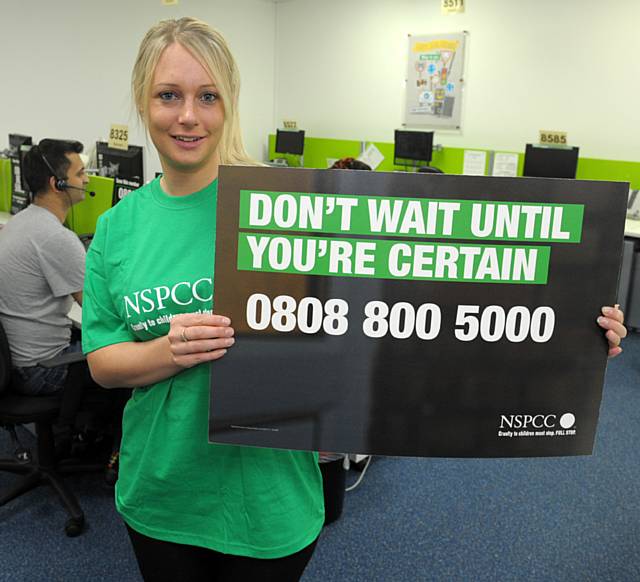NSPCC campaign urges people not to wait to report sexual abuse
Date published: 14 January 2013

Photo: Anthony Moss, Cavendish press
NSPCC staff at the helpline - Dont Wait
A new national NSPCC TV campaign urges people not to wait to report sexual abuse, as new poll reveals fewer than one in five would report concerns as soon as they arose.
Whilst recent media coverage has heightened public awareness of child sexual abuse a poll conducted last week by the NSPCC and YouGov shows that many people are waiting to act, with fewer than one in five (17 per cent) saying they would report concerns as soon as they arose.
These findings are supported by the NSPCC’s own data that shows almost half of people who contact its helpline have waited over a month to get in touch, with some waiting much longer. The charity is therefore concerned that people are still unsure how and when to act.
In response to the unprecedented surge in willingness to take action the children’s charity is today launching a six week TV campaign explaining how the public can report abuse whilst urging them: ‘Don’t wait until you’re certain.’
Every year, the NSPCC helpline receives thousands of calls from people worried about child sexual abuse, and in Greater Manchester last year (1 April 2011 to 31 March 2012) 99 contacts were so serious, they had to be referred on to other agencies like social services or the police to keep the child safe.
Peter Watt, Director of the NSPCC’s helpline, said: “Child sexual abuse is not a problem that died with Jimmy Savile. It is a problem that continues today, with children across the UK suffering at the hands of a minority of adults.
“Whilst the uplift in reports of abuse and new figures indicating that people are more willing to speak out is very welcome, it’s also clear that people are still waiting for that elusive certainty before taking action. People clearly have the desire to act but are unsure how or when to do it.
“The truth is you will probably never be certain because of the hidden nature of abuse, especially sexual abuse. And the poll also shows that 59 per cent of people are not confident that they could spot the signs if a child they knew was being sexually abused.
“This is why we are taking our award winning ‘Don’t wait’ film, directed by Amanda Boyle, to a wider audience as a television advert. Originally produced as an online viral the video will now be shown across the country to give people the information they need to report abuse.”
The poll found that the main barriers to reporting child abuse would be fear of being wrong (59 per cent), fear of making it worse for the child (39 per cent), fear of splitting up the child’s family (17 per cent) and fear of repercussions for the accused (17 per cent).
Psychologist Dr Linda Papadopoulos said: “Jimmy Savile was allowed to abuse in part because people were not certain what they were seeing was abuse, and in part because the children themselves were not listened to or believed. It’s vital that people listen to what children are saying, and that they report concerns immediately even if they are not certain.
“People are understandably concerned about being wrong or making things worse for the child if they say something, but all the time they spend procrastinating that child could be in real danger. To a child who is being abused every day the abuse is allowed to continue can feel like a lifetime. And its important people understand that if they are wrong, a family will not be separated because of their mistake. Trained professionals will tactfully investigate before any action is taken. You can’t be expected to know for certain and that’s where the NSPCC can help.”
Monica* called the NSPCC when her daughter’s friend confided that her violent father had sexually abused her 13 year old sister: “I knew I had to act. I felt the responsibility of what might happen to the family, but I had to do it.
“I don’t know exactly what happened after that, but I do know that shortly afterwards Emily and her sister no longer lived with their father. Sometime later, I spoke to a neighbour who told me that she had heard something that worried her about father’s behaviour toward the children, but that she had not acted for fear of ‘getting involved.’
“I wouldn’t hesitate to call the NSPCC again if I was worried about a child, even if I wasn’t sure. You have to trust your instincts if something feels wrong. We’ve got an obligation to listen to children.”
Anyone who has concerns about a child or wants advice can contact the NSPCC for free 24 hours a day, by calling 0808 800 5000, emailing help@nspcc.org.uk, texting 88858 or using an online reporting form. They can choose to remain anonymous if they wish.
* name has been changed to protect identity.
Do you have a story for us?
Let us know by emailing news@rochdaleonline.co.uk
All contact will be treated in confidence.
Most Viewed News Stories
- 1Abandoned shopping centre to be brought back to life as a banqueting hall
- 2Rochdale Sixth Form College hits new high with twelve Oxbridge offers for students
- 3Record number of norovirus patients in hospital
- 4Rejection of plan for SEN school being appealed
- 5Appeal after man arrested on suspicion of multiple harassment incidents in Rochdale
To contact the Rochdale Online news desk, email news@rochdaleonline.co.uk or visit our news submission page.
To get the latest news on your desktop or mobile, follow Rochdale Online on Twitter and Facebook.

